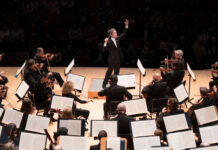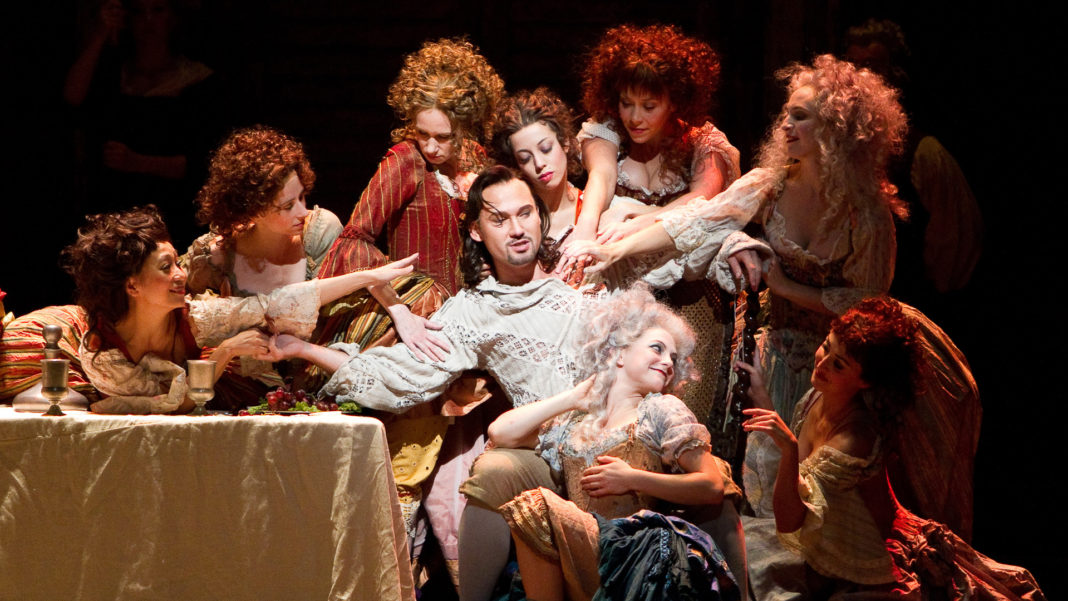Week 16 at the Met finds a mix of very well-known operas with some lesser-known ones. In one production a famed performer says farewell to the Met while another plays a challenging role for the first time on their stages. An opera singer who won a Tony Award also sings a rarely performed opera.
All operas are available on the Metropolitan Opera’s website beginning at 7:30 PM EDT/4:30 PM PDT and remain available for 23 hours. Remember, schedules and timings are always subject to change.
If you read this column early enough, you can still catch Julie Taymor’s production of The Magic Flute on Monday until 6:30 PM EDT/3:30 PM PDT.
Here is the full line-up for Week 16 at the Met:
Monday, June 29 – Donizetti’s La Fille du Régiment
Conducted by Enrique Mazzola; starring Pretty Yende, Stephanie Blythe, Kathleen Turner, Javier Camarena and Maurizio Muraro. This revival of the 2008 Laurent Pelly production is from the 2018-2019 season.
This two-act comic opera written by Gaetano Donizetti was first performed in 1840 in Paris. The libretto is by Jules-Henri Vernoy de Saint-Georges and Jean-François Bayard.
La Fille du Régiment tells the story of a young woman, Marie, who was raised by the 21st Regiment after having been found as a baby on a battlefield. The plan is that when she is old enough she will marry one of the men of the Regiment. She falls in love with Tyrolean Tonio. When the Marquise de Berkenfield shows up, it is discovered that she is Marie’s aunt and she wants to take Marie away to raise her as a lady. Will love win out for Marie?
One of the hallmarks of this opera is the challenge that faces every tenor singing the role of Tonio to hit nine high C’s in the opera’s best known aria, “Ah! mes amis.” In this production Camarena did this so effortlessly he was allowed an encore to do a second pass at the aria and another nine high C’s.
Tuesday, June 30 – Wagner’s Die Walküre
Conducted by James Levine; starring Hildegard Behrens, Jessye Norman, Christa Ludwig, Gary Lakes, James Morris and Kurt Moll. This revival of the 1986 Otto Schenck production is from the 1988-1989 season.
This is the second opera in Richard Wagner’s Der Ring des Nibelungen (also known as The Ring Cycle.) It had its premiere as a stand-alone opera in 1870 in Munich. The first performance of the entire cycle was at Bayreuth six years later. Wagner wrote the libretto as well as the music.
The son of the god Wotan is a fugitive named Siegmund. When he finds himself taking refuge at Sieglinde’s house, the two fall passionately in love. But Sieglinde is married and in order for her and Siegmund to be together Siegmund must defeat her husband in a battle to the death.
This production marked the first time Norman sang the role of Sieglinde at the Metropolitan Opera. She earned rave reviews. What disappointed Donal Henahan is his New York Times review were the very things that make this film possible.
“The most objectionable feature of the evening, however, was also a technological one. Television cameras worked away throughout the performance from positions at either side of the stage and at the foot of both aisles, distracting what surely must have been hundreds of people seated in line with brightly lighted monitor screens. The machines, one learned, were rehearsing for a later Walkure telecast and making ‘scratch’ tapes that might be needed as backups. This, mind you, from a company that will not employ supertitles because they detract the audience’s attention from the stage.”
With this production you’ll get to see the end result of that distraction.
Wednesday, July 1 – Shostakovich’s The Nose
Conducted by Pavel Smelkov; starring Andrey Popov, Alexander Lewis and Paulo Szot. This William Kentridge production is from the 2013-2014 season.
Dmitri Shostakovich’s satirical The Nose was the composer’s first opera. It had its debut in Leningrad in 1930. The libretto was by Shostakovich, Yevgeny Zamyatin, Georgy Ionin and Alexander Preis. It is based on a novel by Nikolai Gogol.
The premise is rather simple. The nose of a Saint Petersburg official leaves his face to go off and explore life by itself. The man goes in search of his missing nose and finds it suddenly much bigger and assuming a position of power over him.
The Nose was not performed in Russian again after its premiere until 1974. This was the Metropolitan Opera’s first production of the opera. It also marked the Met Opera debut of tenor Paulo Szot as the man with the missing nose. In addition to his opera career, Szot appeared on Broadway in the 2008 revival of South Pacific and won a Tony Award for his performance.
Thursday, July 2 – Bizet’s Carmen
Conducted by Pablo Heras-Casado; starring Anita Hartig, Anita Rachvelishvili, Aleksandrs Antonenko and Ildar Abdrazakov. This revival of the 2009 Richard Eyre production is from the 2014-2015 season.
Georges Bizet collaborated with librettists Henri Meilhac and Ludovic Halévy on this immensely popular opera. It was based on Propser Mérimée’s novella of the same name.
When Carmen was first performed in Paris in 1875 it was considered both shocking and scandalous.
Set in Seville, Spain, Carmen is a gypsy who has caught everyone’s eye. A soldier, Don José, plays coy and gives her no attention. Her flirtation causes troubles for both when Don José’s girlfriend, Micaëla arrives. Tensions escalate between the two women and after a knight fight, José must arrest Carmen. When she seduces him it sets off a series of events that will not end well for the gypsy woman.
In his New York Times review of this production, Zachary Woolfe came to a new realization about the characters in this opera.
“Watching Ms. Rachvelishvili stare stonily at the tenor Aleksandrs Antonenko, as Don José, I was aware as never before of the opera’s conceit that these characters have been thrown together, mostly miserably, by fate. They love each other without ever much liking each other.”
Friday, July 3 – Mozart’s Don Giovanni
Conducted by Fabio Luisi; starring Marina Rebeka, Barbara Frittoli, Mojca Erdmann, Ramón Vargas, Mariusz Kwiecień, Luca Pisaroni and Štefan Kocán. This Michael Grandage production is from the 2011-2012 season.
The legend of Don Juan inspired this opera by Wolfgang Amadeus Mozart. The libretto is by Lorenzo da Ponte. Don Giovanni had its world premiere in 1787 in Prague.
Don Giovanni loves women. All women. Early in the opera he tries fleeing Donna Anna. In doing so her father, the Commendatore, awakens and challenges him to a duel. Giovanni kills the Commendatore – an event that will ultimately lead to his own descent into hell.
Michael Grandage, best known for his stage credits including his Tony Award-winning direction of Red, made his Metropolitan Opera debut with this production. His opening night was marked with a major challenge as Mariusz Kwiecień who was announced to sing the title role, had injured his back during the dress rehearsal and was unable to perform. Dwayne Croft sang the role on opening night. Before Kwiecień returned for the rest of the run on the fourth performance, Peter Mattei filled in for the second and third performances.
Saturday, July 4 – Donizetti’s Don Pasquale
Conducted by Nicola Rescigno; starring Beverly Sills, Alfredo Kraus, Håkan Hagegård and Gabriel Bacquier. This John Dexter production is from the 1978-1979 season.
This Donizetti opera had its world premiere in Paris in 1843. The composer collaborated with Giovanni Ruffini on the libretto. It was inspired by the libretto Angelo Anelli had written for Ser Mercantonio, an opera by Stefano Pavesi from 1810.
Ernesto is Don Pasquale’s nephew. He wants to marry Norina, but Don Pasquale wants to choose his nephew’s bride. Others conspire against Pasquale and trick him so that ultimately Ernesto and Norina can marry.
With her role as Norina in this production of Don Pasquale, Beverly Sills gave her final performance at the Metropolitan Opera. This was a new production of the opera and was apparently created with Sills in mind.
Harold C. Schonberg, writing for the New York Times said of Sills’s performance, “The role of Norina did not tax Miss Sills’ vocal resources as much as some recent ones she has attempted. It would be idle to claim that she could handle everything in the part, but she paced herself well, avoided elaborate cadenzas or interpolations, and tried to project a clear line. Her work Thursday night was a triumph of experience and professionalism.”
Sunday, July 5 – Rossini’s La Donna del Lago
Conducted by Michele Mariotti; starring Joyce DiDonato, Daniela Barcellona, Juan Diego Flórez, John Osborn and Oren Gradus. This Paul Curran production is from the 2014-2015 season.
Sir Walter Scott’s poem, The Lady of the Lake, served as the inspiration for this opera by Gioachino Rossini. The libretto is by Andrea Leone Tottola. La Donna del Lago had its world premiere in Naples 1819.
Rossini’s opera is set in Scotland in the first half of the 16th century when King James V reigned. Elena has been promised to Rodrigo, but she’s in love with Malcom. Both men are rebels as is her father, Douglas. The King, disguised as a man named Umberto, falls in love with Elena at first sight, but knows she is related to rebels who want him overthrown. How both the relationships and the politics play out will ultimately impact Elena for the rest of her life.
This production was first seen in 2013 at the Santa Fe Opera who co-produced with the Metropolitan Opera and this was the first time this opera was performed by the Met.
Di Donato regularly sings “Tanti affetti” from La Donna del Lago in concerts. The New York Times‘s Anthony Tommasini said of her performance in this production, “It was good to have the stage so bright for Ms. DiDonato’s triumphant performance of ‘Tanti affetti.’ Besides adding an important Rossini opera to the Met’s repertory, this production gives those who have only heard her sing that aria as an encore a chance to get to know the long opera that precedes it.”
That’s Week 16 at the Met. Join us next week to see what they have in store for Week 17.
Photo: Mariusz Kwiecien (center) in the title role of Mozart’s Don Giovanni. (Photo by Marty Sohl/Courtesy of the Metropolitan Opera)











